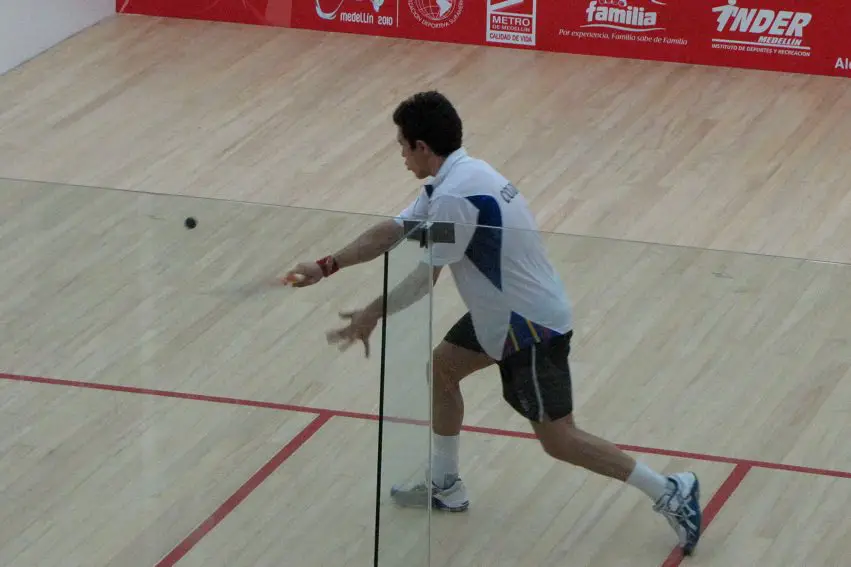Playing racket sports has multiple benefits associated with it and while squash is one of the tougher sports to play, the multiple benefits of playing squash have often been chronicled by doctors. Below we have dug deeper and mentioned the reasons why you should look at playing squash if you are aiming at fitness as one of your goals.
Squash is a vigorous sport, as you would see from the benefits mentioned below but we would also ask you to take advice from your family or local doctor before you play any kind of such sports including squash.
While the health benefits associated with squash are many, there are a few things you should be careful of, and we have made a mention of those in our piece titled ‘Is Squash a Dangerous Sport’ here. Do give this a read before you actually start playing squash.
Having said that, let’s now look at why should people look to play squash if they can.
What are the health benefits of squash?
There are multiple health benefits associated with playing squash. They are:
- Quick Calorie Loss
- Improves Cardiovascular Health
- Agility & Flexibility Booster
- Improves Strength
- Better Hand-Eye Coordination
- Mental and Other Health Benefits
Let’s look at each of aforementioned benefit in further detail.
Table of Content
Quickest Form of Calorie Loss
Ask any health or weight-loss expert about squash and their eyes light up. That’s because playing squash helps lose calories in a double quick manner, quicker than most other sports at least.
In turn, this helps you lose weight in a very healthy manner.
According to LiveStrong.com, you can lose 400-500 calories with just 30 minutes of playing squash depending on how much you weight.
To give you a perspective, walking helps lose 120 calories, playing badminton loses less than 150 calories, playing tennis helps lose 200 calories and even swimming loses around 330 calories in that same time. Below is a table comparing the calories lost playing different sports.
| Sport | Calories Lost* |
|---|---|
| Bowling | 220 |
| Stretching | 300 |
| Volleyball | 300 |
| Walking (6 km) | 300 |
| Curling | 300 |
| Badminton | 330 |
| Swimming | 450 |
| Pickleball | 500 |
| Stationary Cycling | 520 |
| Soccer | 520 |
| Tennis | 520 |
| Beach Volleyball | 600 |
| SQUASH | 900 |
(*by someone of approx. 70 kg weight in 1 hour)
Clearly we have a winner here in the form of squash!
Also Read:
Improves Cardiovascular Health
Before we jump into this, it must be quickly added here, please ensure you do not have any kind of pre-existing, heart-related illnesses. Even played at a recreational level, squash can get quite competitive and tough.
That being said, for most, squash is a great form of cardiovascular improvement. The amount of running, stopping, bending, changing directions, not to mention expending energy to get to the ball and attempt to return it all adds up to a serious cardiovascular workout.
It helps in getting that heart go quicker, pumping more blood to the rest of the body and increase the oxygen supply as well.
Agility & Flexibility Booster
Three hours a week of squash is enough exercise to ensure the body remains loose and flexible. And the reason for that is simple.
As mentioned earlier, squash needs the players to run, stop bend and change directions, and that improves your agility as compared to someone not playing any sport.
There are occasions when squash players need to dive to get to the ball as well. And while squash can leave you sore if you aren’t properly warmed up, with the right guidance it can go a long way in getting your body nimble.
Improves Strength
A squash ball (read more about it here) is hollow and made of a material that allows it to get warmer and play quicker with time. However, it needs the players to impose a lot of strength in a bid to get it going, especially at the start of the game or else the lack of bounce makes it tougher to play, especially at the highest level.
Even as a beginner, while you would use different types of balls which bounce more than at the highest level, it needs you to unleash a lot of force to get things moving. It is this constant and consistent racket-swinging which immensely help develop your hand and arm muscles.
On the other hand, the constant running and changing directions is an excellent builder of stamina and strength for the lower part of the body, including calves and thighs.
Also Read:
Betters Hand-Eye Coordination
This is true for most sports but even more so for squash because of the nature of the ball in use.
Squash balls have to be warmed up before they start to bounce their optimum levels. That implies at different times during a game, a squash ball could bounce differently, and as a result, it forces players to focus more than usual on it.
That, in turn, helps improve your hand-eye coordination. With age, our hand-eye coordination begins to lower and playing squash – or any other racket sport – is a great way to remain on top of that for years.
Other Health Benefits
Squash’s health benefits aren’t just restricted to its physical ones.
Squash, as a sport, is a lot about its physical aspects, but there are mental aspects to it as well. In fact, as you grow into squash and have come close to mastering those physical factors, a lot of squash is mental.
Strategy plays a decent role as well in squash, and that allows you to improve your mental health.
Squash is also a great way to improve social skills. The sport, after all, is a good way to get in touch with fellow squash lovers, in turn forming a community and leading to a bond between players at, say, your club.
An active social life is a must for one’s mental well-being as was also seen during the coronavirus pandemic.
The continuous social distancing imposed by the pandemic led to psychological issues among some people which is a stark indicator about how important the role of the society and social life is.
Playing and being good at a sport is a solid way to increase one’s self-confidence. Squash allows that but even if you aren’t the best at it, its physical health benefits will aid in a general uplifting of one’s esteem and confidence.
The other advantage of playing squash is since it’s an indoor sport it can be played all year around. Some sports like tennis or cricket cannot be played in the winters or rains but squash is immune to weather changes, and whatever time of the year, you don’t have to worry about checking with the weather-man before a friendly game of squash.
And because squash is that competitive and can be played without weather or seasonal interruption, it helps set a regular routine for players at every level. Kids can set themselves for, say, three days a week of squash and shuffle the remaining days with a seasonal sport and the more professional players can do the same more regularly without any major obstacle.
This inculcates a sense of discipline among those playing it.
Conclusion
While squash is a vigorous sport, it has multiple physical and mental benefits associated with playing it. We would always advise you to check with your physician in case you have any health issues but as a sport, recreational squash is very healthy for a human body in the aforementioned ways.


